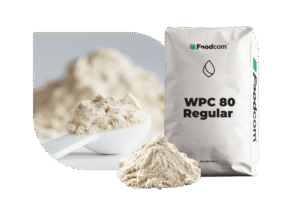In the world of high-protein dairy products, whey protein WPC 80 and its similar counterpart, WPC 82, are extremely popular. For those involved in food processing, athletes, dietary supplement manufacturers and companies in the dairy industry, the choice of concentrate is of great importance. How exactly do WPC 80 and WPC 82 differ from each other? Does a two per cent difference in protein content really matter that much?
What is WPC?
Whey protein concentrate 80%, also known as WPC 80, is a product obtained from whey, a liquid by-product of cheese production.
Modern filtration methods make it possible to obtain a dry powder with a high protein concentration and a relatively low fat and lactose content.
WPC 80 concentrate is characterised by very good digestibility and a complete amino acid profile, including a high content of branched-chain amino acids (BCAA). It supports muscle regeneration after physical exercise and promotes muscle mass growth. It is a popular choice among athletes, physically active people and those on high-protein diets. It can be used as an addition to shakes, porridge, baked goods or desserts. WPC 80 is also a convenient and quick source of protein in your daily diet.
WPC 80 vs WPC 82 – differences in composition
The main and most noticeable difference between WPC 80 and WPC 82 is the protein content in dry weight. As the name suggests, WPC 80 contains about 80% protein, while WPC 82 contains about 82%. Is that a lot? From a technological point of view, definitely yes. This 2% may mean a lower content of other ingredients, such as fat or carbohydrates (mainly lactose), and thus a higher protein purity.
But that’s not all. The products may also differ in:
- taste – WPC 82 has a milder, more neutral taste due to its lower lactose content,
- solubility – the higher level of protein purity promotes better solubility,
- colour – more purified protein often has a lighter shade.
What are WPC 80 and WPC 82 used for?
Both 80% whey protein concentrate and its more concentrated version, WPC 82, are widely used in various industries:
- in the production of sports nutrition and dietary supplements,
- as an ingredient in protein bars, shakes and functional drinks,
- in dairy products with increased protein content, such as protein yoghurts,
- in baking and confectionery – to improve the nutritional value of baked goods,
- in clinical and dietary nutrition.
WPC-based products are increasingly being used as an alternative to classic forms of milk, such as whole milk powder or full-fat milk powder, due to their higher protein content and lower calorie content.
Why is it not just the protein content that matters?
Although the difference between WPC 80 and WPC 82 is theoretically only the protein content, practice shows that the choice of the right raw material has a significant impact on the final product. In industrial production, repeatability and quality are important – better powder solubility, thermal stability and taste can determine the advantage of one raw material over another.
Interestingly, some plants deliberately choose WPC 80 over WPC 82 because the slightly higher lactose content promotes caramelisation and improves the taste of baked goods and desserts. On the other hand, for companies producing dietary supplements, protein purity and the absence of lactose are essential – in this case, WPC 82 wins.
How to choose the right product for your company?
If you are a manufacturer or plan to expand your range with high-protein products, it is best to test different raw material variants. That is why on the FDCM.eu platform you can order samples of both WPC 80 and WPC 82 to compare their properties in your production process.
FDCM.eu is a professional B2B platform for the food industry, offering high-quality raw materials, including whole milk powder, milk powder, and specialised milk proteins such as whey protein WPC 80. This allows you to precisely match the ingredient to your product – whether you are creating innovative beverages, protein creams or functional foods.
Which protein is better?
There is no clear answer to the question of which protein is better – WPC 80 or WPC 82? It all depends on the application, taste expectations, final product composition and production technology. WPC 82 is a better choice for products where high protein purity and low sugar and fat content are important.
WPC 80, on the other hand, is suitable for products where additional ingredients such as lactose or milk fat improve the taste and texture of the product.
If you want to test the difference in your own production, nothing could be simpler. Just go to FDCM.eu and order a sample of the product you are interested in. Sometimes a small change in raw material can make a big difference in the taste, performance and quality of the final product.







